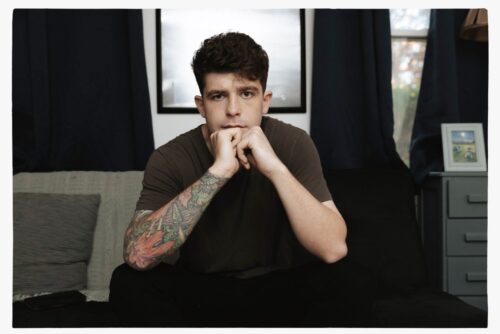Christopher Cobley, 2023 MFA in Music Composition
CENTER FOR ART + SOCIAL JUSTICE STORIES:

Meet composer and class of 2023 graduate Christopher Cobley, one of two recipients of VCFA’s 2022 Center for Arts + Social Justice Thesis Fellowship Grant. The Center for Arts + Social Justice Thesis Fellowship Grant is a $5,000 grant awarded to two students annually to support thesis work focused on a social justice issue. In recognition of the Center’s mission, priority is given to projects that seek to create community-based change through the arts, and/or show the potential for future community impact.
Christopher Cobley’s VCFA thesis critically explored mental health and how art can affect change in others. Proposed as “Audile-Narrative Dissonance,” Cobley’s work seeks to accessibly frame challenging subjects. As Cobley explains, “Tangible change regarding the understanding and treatment of mental health requires a shift in cultural perception, divorced from the highly polarized political landscape. This project intends to target commonalities and shared idiosyncrasies within the human experience—not only between those who endure the extremities of mental illness but also those who scarcely engage with such topics.”
In the summer of 2023, VCFA had a Q&A conversation with Cobley about his Center supported work. Read excerpts from our Q&A and listen to Cobley’s work below.
The Q&A
Q: What kinds of themes and ideas do you explore in your work and why?
A: My interests include cognitive psychology, psychoacoustics, and the development of nuanced forms of narrative communication through concepts of deconstructivism.
My grandparents had a profound impact on my life. Since their passing, and alongside the development of a relatively severe mental health disorder, I almost ritualistically contemplate the opportunity to talk to them again. During my grandmother’s eulogy, a quote was read that she had written on the back of a random business card:
“The life of one we love is never lost. Its influence goes through every life it ever touched.”
- Katie Ashley. Don’t Hate the Player…Hate the Game (2013)
I learned a couple of years later that she was an accomplished mental health nurse, known for her unwavering kindness towards even the most unpredictable of patients. Though my own experiences with mental illness have worsened, they have also informed me of the importance to communicate, educate, and reform our cultural approach to the issue. It has ostensibly become my purpose in life to carry on her personal and professional efforts in the artistic medium of music. This keeps a part of my grandparents’ spirit alive in some way, and so I have devoted the rest of my life to this pursuit.
Q: For those who may be unfamiliar with your work, could you summarize/explain what your Center supported thesis work was? What was it and what did it explore?
A: This project consisted of two distinct elements, my thesis paper on “Audile-Narrative Dissonance,” and a triptych of compositions attempting to employ this methodology.
Thesis Paper: Developing conceptual frameworks for accessibly communicating difficult subject matters, in particular, disorders of thought. This involved cross-disciplinary research of psycho-narratology in various artforms, analysis of specific works that have ingeniously navigated complex themes, as well as a review of philosophical schools that work to explicate the underlying utility and purpose of such exercises.
Triptych:
I. Meaning – signalfire to signified (semester 2)
II. Memory – the world forgetting, by the world forgot (semester 3)
III. Mood – anhedonic silver linings (semester 4)
Q: In your work, you have said of this project: “The underlying principle of this thesis concerns how art can affect change in others.” How can art affect change in others, and how do you approach such a concept in your work?
A: Mental illness is a deeply personal topic for me, but simultaneously encompasses broad aspects of the human experience. It is my belief that defined disorders of thought (bipolar, major-depressive, schizophrenia, etc.) are the extremities of indiscriminate, all-encompassing cognitive processes that we all deal with to some extent. By providing a canvas on which audiences can stimulate their own emotional vocabulary, reflect on their own experiences, and develop a more nuanced understanding of the topic, I imagine that an individual’s reality may be validated through self-discovery. We need to provide this canvas to allow imagination, to protect ourselves against a culture and media which often work to repress any sense of connection. There is a growing body of literature that suggests self-effacement and isolation—in conjunction with environmental factors and genetic predisposition—can cause the onset of psychotic disorders (even early-onset dementia). I feel that community, communication, and commonality validate our realities from customary self-doubt, and encourage an environment for preventative action.
How can an individual develop such a vocabulary, cultivate coping mechanisms, and nurture skills key to critical thinking if the narrative provided is always absolute, listless, or indifferent? Every reading of a given text, no matter how distant from the original intent, is equally valid so long as it has induced a personal response.
My aim for the triptych was to evoke extra-musical narratives (tone poems, in a sense), without the subject being directly “in frame.” The idea was to describe what something is like because its reality is less accessible. Therefore, the notion of deconstructing my compositional processes—reframing the movements as my attempts to accessibly realize them—felt like an appropriate method for generating communicative material. This appeared to be a valid expression of “La condition humaine” whilst maintaining authentic personal intention.
Q: It’s often been said that “Music is our universal language.” I’d love to know your thoughts on that idea, especially in terms of creating music that aims to affect change.
A: First, a quote:
“It’s a calming thing to learn there is a word for something you felt all your life, but didn’t know was shared by anyone else. It’s even oddly empowering—to be reminded that you’re not alone, you’re not crazy, you’re just an ordinary human being trying to make your way through a bizarre set of circumstances. …
Language is so fundamental to our perception, we’re unable to perceive the flaws built into language itself. It would be difficult to tell, for example, if our vocabulary had fallen badly out of date, and no longer described the world in which we live. We would feel only a strange hollowness in our conversations, never really sure if we’re being understood.”
- John Koenig, The Dictionary of Obscure Sorrows (2021)
Language can be a powerful tool to create this kind of change. I feel that music possesses an intangible element that may be uniquely utilized to develop an emotional vocabulary, with fewer instances of the polarizing verbiage and connotative rhetoric that can plague the spoken and written word. This is valuable, as it allows for personal reflection on our experiences, and may also equip the individual to face new difficult experiences. With my work, I hope to not only speak to those whose experiences lie at the extremities of severe mental illness, but also those who may not engage with these topics on a conscious level at all.
Q: How has this Center fellowship helped support and inform your art?
A: Reception of the [Center] fellowship has genuinely altered the trajectory of my life. The opportunities provided for networking, presentation of my thesis project, and connecting with other Center fellows are experiences I will cherish and carry with me in all my future artistic and academic endeavors.
The grant has allowed me to dedicate significantly greater time for the development of my thesis project, as well as the funding of resources necessary for experimentation and realization of my accompanying compositional output. Beyond the tremendous personal benefits afforded, what this grant most importantly represents is validation of the necessity for mental health to become a mainstay of future public discourse. I will maintain contact with, collaborate with, and support this amazing institution in any way I can moving forward. I hope this will go at least some way to redressing the balance.
Stay in touch with Christopher Cobley and his work at www.christophercobley.com.

